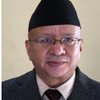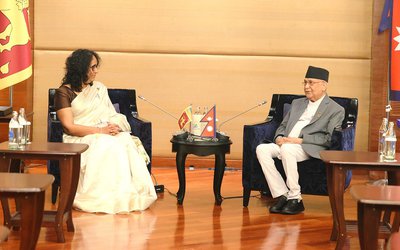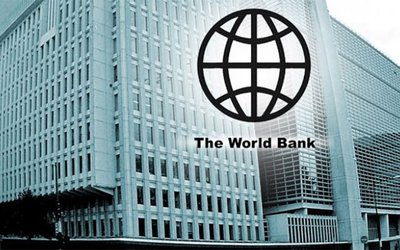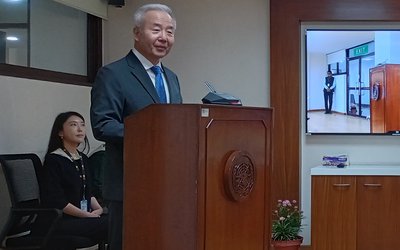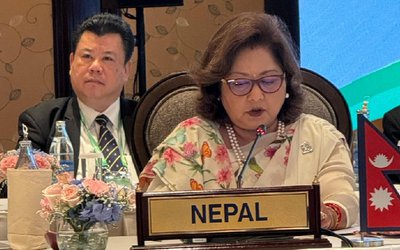Prime Minister Pushpa Kamal Dahal has promised to improve public services. Presenting the proposal for the vote of confidence in the House of Representatives meeting, Prime Minister Dahal promised to improve the inefficiency and slowness seen in various government agencies. Mentioning the long queues to get various services, he said that every citizen should feel that the government is their guardian. He said, 'Government is not the owner, it should be the servant of the people. The picture of government is changing but people's standard of living does not change now has to be changed.
The government now has to become a servant that is heard, seen and experienced by the people.'' he said. Referring to the addition of necessary staff in the state and union, Prime Minister Dahal said that the problems seen in the transportation system services, community schools, and government hospitals will be solved immediately, while the Ministry of Finance has reduced the flat by 20 percent.
Along with the establishment of the state, its effective operation and multifaceted aspects of development are interrelated. In ancient times, the geography itself was called the state. But today, to be a strong state, along with geography, population, Constitution, democratic values and international recognition are needed.
A separate mechanism has to be developed for effective coordination between these multiple parties within the state is indispensable. In any country, there is a permanent mechanism in the state to carry out the day-to-day administration of the state, development, social welfare, protection of geography and culture, development and expansion of international relations. which is called bureaucracy or civil service.
Because of this, this mechanism operating in civil and non-civil services is known as permanent government.
The service provided to citizens through this mechanism is public service. In other words, the service provided by the state and government to increase the welfare and satisfaction of the citizens is 'public service'.
It is natural to expect good behavior, politeness, speed in work, fairness and cleanliness from the employees when the customer goes to the government office in the technological age of the world. However, due to various reasons in our country, this could not happen. And it is said by the Corrupaton Perception Index that corruption is rampant, which needs vigorous efforts and commitment .
Different countries have their own type of work culture. But without the development of working culture and working system, economic and social development of any country cannot happen.
The American experience regarding public service delivery, what kind of communication tools do people want to receive services to what extent and what kind of services is the government providing?
The following responses were received from a study conducted by an American organization in the United States.
From this, it appears that the service users want to receive services using information technology rather than attending the service provider themselves.
Street Bureaucracy in Belgium
It is said that street bureaucracy is in operation in Belgium because the common people can get the necessary services from the street. Just like the commercial banks of Nepal have installed ATM machines in various places, the Belgian government has installed computers to provide government services in various places. The customer can get the necessary information and services through the same computer. Complaints about that too.
In Nepal, a voice recorder has been arranged in the office of the Prime Minister and the Council of Ministers to manage the complaints 24 hours a day. Nepal Police has operated a 24-hour control room. From time to time, mobile services and camps operating in remote parts of Nepal have been working to effectively provide services to the people according to the concept of mobile government.
State of public service delivery
The government of Nepal has been providing services to the people in various fields, from passport, citizenship, national identity, peace and security to telephone, electricity, drinking water, education, health, agriculture, etc.
People have benefited from these services, although looking at the current state of public services, it is seen that there are extreme complaints and dissatisfaction among the service receivers regarding the attitude of the political sector, the response of the people receiving the services and the availability, quality and effectiveness of the services.
Up to now, most of the study reports related to administration reform have presented suggestions for improvement in the field of service operation by pointing out various deficiencies and weaknesses. However, there are few examples of those suggestions being implemented in practice. The reasons for these deficiencies are as follows: Lack of political commitment, lack of appropriate and practical policies and procedures, lack of public accountability in service provider agencies, lack of appropriate incentive system for employees involved in service delivery, lack of flexibility in the procedures for service delivery designed from the central level in accordance with local social, economic and geographical diversity, service delivery, Not being able to use financial, human and material resources properly in the work, because the programs related to service fulfillment are not objective and procedural, not being able to pay proper attention of the policy makers to whether the real purpose of providing the service has been fulfilled, continuous supervision from the top level of the workplace offices in the work of bringing efficiency and frugality to the service.
Failure to do so, due to the lack of awareness among the people receiving services, due to lack of proper pressure on the offices that provide services from them to provide services effectively as required, even though the posts are being filled in many offices in remote districts, most of the employees are absent from the districts.
Disruption in the operation of services and a widespread decline in the morale of the employees involved in providing services to the people etc. Modern models of public service delivery
Quasi-marketization and agencyization are considered as two important modern models of public service delivery. Through which the state provides services to the public as part of its obligations.
Public service is the bridge between the state and the people. Along with the development of state and governance system, the concept of public service has evolved. In the initial stage of state management, the work of protecting the country and the people on behalf of the state was understood as public service, but at present, public service refers to the totality of services and facilities provided by the state for the paramount interest and welfare of the people.
Public services have the characteristics of being received equally by all citizens, adopting certain methods and methods while providing services, not aiming at profit, being provided by the state or government, and being considered as the responsibility of the state and the rights of citizens.
It is a means of establishing a harmonious relationship between the state and the citizens. Its effectiveness and quality helps to maintain good governance in the state.
In the 1980s, although the private sector managed to win the hearts of consumers by providing prompt and quality services to their consumers, a wide debate began about the government not providing effective services to the people.
In the middle of the eighties, the concept of innovative public management was developed in order to adopt the good aspects adopted by the private sector in providing services to the consumers in the government sector as well.
One of the important principles of modern public management is the 'Public Choice Theory'.
Quasi-marketization is considered as an important element of this. The act of delivering public services to its citizens through the market is called quasi-marketization.
With this, common people can choose the service provider and get the service through the competitive service provider. The government bears the responsibility for that service.
Public administration is a legally established state-controlled mechanism that collects the necessary means and resources for the operation of the state and distributes them in a fair and appropriate manner.
Scholars like Plato and Aristotle took administration as the main basis of state management, but until 1887, administration was considered as a branch of political science. In 1887, Woodrow Wilson insisted that administration should remain a separate discipline, separating it from politics.
The concept of innovative public management was developed in the 1980s due to the slow, process-oriented and disorganized nature of traditional public administration mechanisms. An important concept embraced by modern public management is agency.
The fact that public administration can be made competitive, efficient and result-oriented by adopting methods such as agency from the research done by organizations such as the World Bank, agency is considered as a tool for public administration reform.
Generally the core functions of the state cannot be devolved. Government functions related to national policy making, administration of justice, security, currency and finance and foreign affairs are generally not agencyised.
A few years ago, the departure and arrival forms that passengers leaving and entering Tribhuvan International Airport must fill and submit at the immigration desk were abolished. It was only after the end of this problem that the Nepalese going to foreign jobs were facing that this process which has been going on for years is useless.
This was a moving example of how the unjustified practice has been going on for years, causing unnecessary trouble to the passengers. Despite stopping to fill this letter, the rude and unhelpful behavior of the immigration staff at the airport seems to have improved.
Service seekers are aggrieved by the behavior and service delivery of the government base, which is the daily work of citizens, including paasport, national identity, citizenship, immigration, shipping, water supply, electricity, transportation, taxes, district administration, police, labor, agriculture, and courts.
Common citizens who are suffering from sloppiness, slowness, complicated process, intention to get illegal benefits etc. wish that they do not have to take such offices as much as possible. Somehow the youth class think that the government offices are not for the convenience of the citizens but to impose the regime.
The government, which has not been able to provide even the minimum services and facilities, is collecting taxes from the common people under many names. After going to the federal system, the tax burden has increased.
However, the common people have not got the facilities of convenient roads, quality drinking water, waste management etc.
Others have to face harassment even when they go to pay taxes to the government. Since those who do not understand that it is their duty to serve the common citizens are in the place of service, the trend of ruling and exploiting the citizens has increased.
It is necessary and mandatory to address it properly. Due to the indifference of the employees, the citizens are not getting basic services and facilities, and there is no regulation in the market price and quality.
In general, common people complain about the time taken to get services at government offices, the behavior of employees towards the service users, the arrangement of hearing complaints, etc. Those without access have to take great pains to get the services that those who have access get immediately. Public services that should be provided for the convenience and welfare of the common people should be provided by the government without taking any profit. However, the local level also charges for the birth and death registration of citizens. There is no alternative to go to the district headquarters with a letter of recommendation for citizenship. If you have to wait for a month to get a passport from the district, you have to go to the capital to get it quickly.
The suffering of having to run for work in the land registry, surveyor and court is indescribable. You have to pay the amount even if there is no drinking water in the stream or even if the quality of water is not fit for consumption.
In some places, even if you don't know where to go, you have to pay the electricity fee. Also, you have to wait for months while applying to get an electricity meter box.
You have to pay a fee for garbage collection, but the garbage in front of the house is not picked up for weeks. There is some improvement in this in few months time . It is not thought that it is the government's responsibility to provide quality services and facilities to the citizens, instead of simplifying the process to make things work, the tendency is to shift the responsibility to others and leave the common citizens crying.
The customer should not be present at the office to receive public services, moreover, if he goes to an office with documents for the same job, he has to go to several rooms for the work that can be done in one room.
The online system is limited to gossip. Government offices do not have the courage to adopt the token system instead of keeping the customers in a long line.
Currently, after the arrival of the new home minister, the issue of time card has been raised. Even the submitted documents are returned saying that they do not match.
In the context of Japan's tight public administration, they say that such a mess is because the government is not accountable to the citizens and good governance. If necessary, it is the government office's responsibility to photocopy the citizen's certificate, but the practice of submitting the same document dozens of times cannot be good governance.
The dominance of the middleman Government offices are public owned by middlemen and mafia. It is said that the middlemen in collusion with the government employees have created a situation where the service users will not be able to work without the funds.
However, before entering offices such as transport, cargo, district administration, where there is a crowd of customers, the brokers come to crash.
In some government offices, brokers are found in the seats of employees. They get 'additional benefits' for searching for the relevant file, filling in the form, keeping the recommendation and other documents in order, going to many rooms and taking instructions and finally making a decision.
In some districts, the situation has not changed even though the government officials have declared middlemen prohibited areas. In this way, even in the work that should be easy, middlemen do the exchange of money between the service receiver and the service provider by creating procedural difficulties.
On the other hand, in order to avoid the long queues, the compulsion to go to many rooms, and the hassles of delivery, the service clients also prefer to get the work done through brokers.
It is said that middleman-king has increased due to the tendency of government officials delaying or not to work until they have benefits.
- “Kolahalko Kolaj “: A Collection Of Scattered Memories By Prakash Sayami
- Apr 02, 2025
- Nepal-India Trade, Transit And Unauthorized Trade: Some Considerations
- Jan 16, 2025
- PM Oli’s Forthcoming Visit To China: Will The Achievement Be Complete?
- Nov 29, 2024
- Obituary To Dr. Mohan Man Sainju!
- Nov 02, 2024
- Donations To Political Parties: Some Reflections
- Oct 24, 2024
